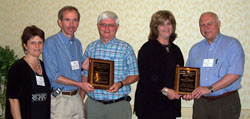Archived Page
The information on this page is archived and provided for reference purposes only. It was current when it was produced, but may now be out-of-date. Persons having difficulty accessing this information may contact kcl@nei.nih.gov for assistance. For reliable, current information on this and other topics, we recommend that you visit the National Eye Institute website index.
News and Events
NEI Investigators Receive Post-Katrina Awards
July 3, 2006

Pictured are: Dr. Maryann Redford, left, NEI project officer for the ETROP Study, joining Dr. William Good, principal investigator (PI) from the study headquarters in San Francisco, and Dr. Robert Hardy, far right, PI from the coordinating center in Houston, in presenting ETROP Inspiration Awards to Dr. Robert Gordon, PI in the New Orleans study center, and to Debbie Neff, New Orleans study center coordinator.
In spite of hurricane Katrina and its aftermath, New Orleans-based NEI Early Treatment of Retinopathy of Prematurity (ETROP) Study investigators achieved 100 percent follow-up with children in the study. Some of the children had been relocated with their families to other states, such as Mississippi and California.
Retinopathy of prematurity (ROP) is a potentially blinding disorder that affects an estimated 14,000 to 16,000 premature, low birth-weight infants each year in the United States. The ETROP Study assesses early treatment versus conventional management of high-risk ROP. Infants are examined by ophthalmologists at six months, nine months, and annually until six years of age.

